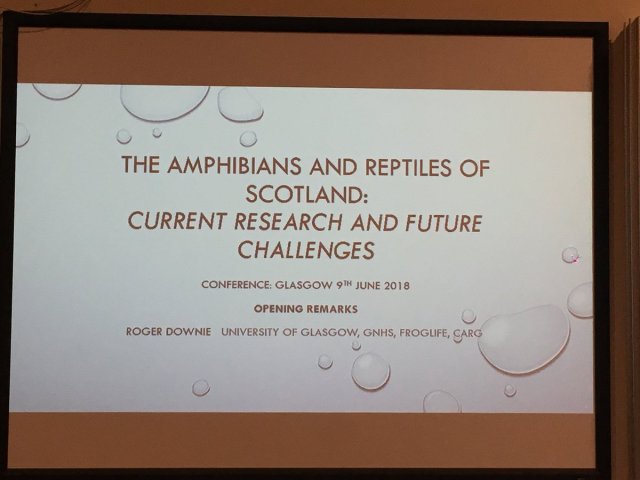On Saturday 9th June, herpetologists from all over the UK (including me) gathered in Glasgow for a very special occasion. The Glasgow Natural History Society, in conjunction with Clyde ARG, had organised a fantastic line-up of herpetologically themed talks for a one day conference, ‘The Amphibians and Reptiles of Scotland: Current Research, Future Challenges’. This conference was also organised as one of the events of the Glasgow Science Festival which aimed to engage members of the public of all ages in various aspects of science. One of the main driving forces behind this special meeting, was the publication of, ‘The Amphibians and Reptiles of Scotland’ a brand new book, co-authored by Chris McInerny of Glasgow University and Pete Minting of ARC and published by the Glasgow Natural History Society. For those of you who were unfortunately unable to attend, you missed a great speaker line-up covering all aspects of amphibian and reptile conservation and ecology in Scotland (and beyond). The whole day was thoroughly enjoyable and the best part was that it was free! Even the journey, from London to Glasgow, was both speedy and pleasant, and I’m certainly happy that I made the trip. It was only my second time in Scotland, I definitely need to visit more especially to see some Scottish herpetofauna.

My favourite talk of the day was given by Dr Silviu Petrovan of the University of Cambridge, based on his work whilst at Froglife. The talk was on how effective road mitigation schemes are for amphibians and reptiles, and provided an overview of a number of different projects with a measure of their success. I had been involved with a couple of these projects whilst working with one of Silviu’s PhD students so it was good see the results from all the hard work we had put in. Whilst I knew that roads had a major impact on amphibian mortalities, what I didn’t know was how ineffective many of the mitigation strategies are at maintaining the populations of the species they were designed to support. With this in mind, it was also good to hear presentations by Chris Cathrine and Chris McInerny which both highlighted successful mitigation strategies for unconventional development sites. Despite the fact that mankind has been observing the wildlife in ponds for many years, it is clear that we still know little about the creatures that inhabit these watery worlds, and there is still much to discover and investigate. This is particularly true for Scotland, with its rugged terrain and remote populations of both reptiles and amphibians. I would like to thank members of the Glasgow Natural History Society who worked tirelessly to organise such an amazing conference.

If you were unable to make it then check out the hashtag #ARoS18 on Twitter for posts from the day or get in touch as I produced a detailed transcript from the day.




